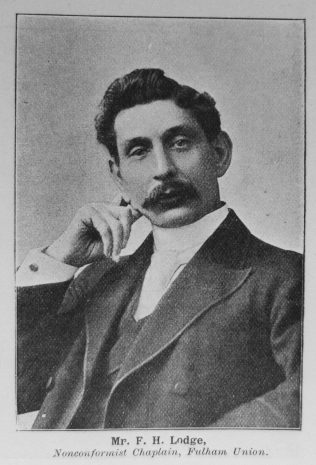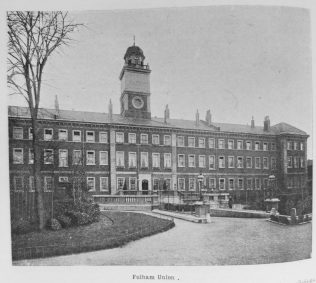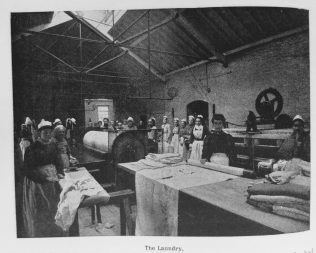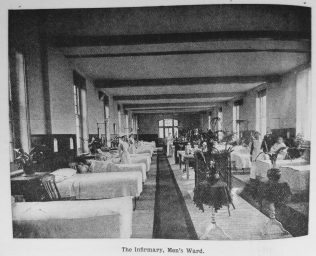F.H. Lodge - Free Church Chaplain, Fulham Union
A Sketch and an Experience






Transcription of Sketch in the Primitive Methodist Magazine by Robert Andrews
THE problem is difficult; how to bridge the chasm between riches and poverty, and bring the superfluities of one class to meet the needs of another. Destitution has existed from time immemorial. Moses reminded Israel “the poor shall never cease out of the land,” and wrote the God-given poor law: “Thou shalt open thine hand wide unto thy brother, to thy poor and thy needy.” The early church recognised the inequalities of life, and attempted a communism which speedily shewed signs of failure in the deceit of some of its members. Our present Poor Law system arose out of the changed conditions of society which followed the decline of feudalism and the enfranchisement of the people, and also from the suppression of the religious houses by Henry the Eighth. Previously the poorer classes were the retainers of the nobility and wealthy, or clustered round the monasteries and were fed by doles. The earliest statute for parochial taxation for the poor dates back to the reign of Elizabeth, when parish officers were directed to provide sums of money to set the poor to work and give relief to the lame, impotent, and blind. Bylaws passed in successive reigns, it is now become established that persons in poverty may legally claim the necessaries of life. Great changes were effected in the year 1834; parishes were grouped into unions, and the basis laid for the present elaborate system of indoor relief. The number of paupers in England and Wales, as reported, in 1902 was 824,627, and the amount spent in relief was over twelve millions sterling. Broadly speaking there are two classes that fil our work-houses—one, the incorrigibly bad, rendered dependent by their vices, drunkenness, or idleness – the other, persons beaten in the race of life by stronger competitors, the aged, afflicted, deserted, widowed and orphaned. On our recent visit to Fulham Union we found 765 inmates in the workhouse, and 470 under medical treatment in the infirmary. In an interesting conversation with the Master and Matron, Mr. and Mrs. Davey, we were impressed with their deep concern to do wisely and well in their responsible position – a position requiring much firmness, discernment and tact. We learnt from the master he was a child of Methodism, being educated in a Wesleyan Day School, and receiving his religious tuition in the Methodist Free Church, Bodmin. Surely Dickens‘ race of Bumbles must have passed away if Mr. and Mrs. Davey be typical of present day Poor Law of?cials. There is a religious side to the workhouse; for the State wisely cares for the moral wants of the inmates. We were especially interested in Fulham Workhouse by the unanimous appointment in the year 1900 of an old personal friend and fellow worker, Mr. F.H. Lodge, as the first Nonconformist chaplain. Not the least good accomplished by the Free Church Federation is the effort made by many of the Councils to voice the claims of Non-Conformity. With the consent of the guardians a service was established by the local council on Sunday evenings in the dining hall, and supplied by the various churches.
It was soon seen it was necessary that the Free Churches should be represented on the religious staff of the house, and the guardians with the sanction of the Local Government Board made the above appointment. Mr. Lodge is a loyal and long-standing Primitive Methodist. He was one of many young converts brought to Christ in Caledonian Road Chapel, London, in the early seventies of last century, and continued there as a member and worker until his removal. Business led him to settle at Maidenhead. At that time there was not much that was inviting either in the Chapel or its situation to attract a young Cockney, but Mr. Lodge, instead of deserting his church for fairer pastures, joined with other worthy brethren in hearty co-operation with the Rev. George Doe, now in retirement at Bournemouth, and his devoted wife, to rear the present attractive sanctuary in one of the principal streets of the town. It was there we had the pleasure of renewing our acquaintance with him, and found he had then graduated as Local Preacher, was Superintendent of the School, and Secretary to the Trustees. On the formation of the Free Church Council in that district he was appointed its magazine secretary, and rendered considerable help in the Council’s work. Providence, we have no doubt, guided him to his present sphere of service, for which he is well adapted by the sympathies of his nature and the training he has received as a Christian worker. His duties are manifold, sick visitation and instruction of those inmates who are Non-Conformists, the conducting of a service on Sunday and Tuesday evenings; and in addition to appointed duties he finds time for the performance of much kindly ministry. Mr. Lodge has many a pathetic story to tell and could unfold the history of many a sad heart. He was not long in discovering there were Primitive Methodists who had found their last earthly home in the house. Among these was Mrs. D., aged 85 years, who, with her husband had been members in East Anglia. Her joy was to talk of the days of her youth – of old ministers and mighty converting times. By the good offices of the Chaplain, another old member of our church, Mrs. C., from the same district, was introduced to her, and these two often held sweet counsel o’er the past. When Mrs. D. laid down the pilgrim staff, she said, “I’m going home, not to a work-house, but to a real home made ready by God himself.” During a well-earned holiday, we took on his duties as locum tenens with all the ability of a novice who had never seen inside a poorhouse and had its romance and tragedy to learn. We soon found our friend’s name was a name to be conjured with, and the supply could not banish thoughts of the old hand. It was a little city within a city with men and women busy on every hand, the tailor plied his needle, the shoemaker cobbled the boots, the basket maker wove the withies, the carpenters constructed and repaired, the wood choppers cleaved and bundled fire-wood, the vagrants pounded the granite to size, the gardeners kept the grounds neat and trim, and laundry-maids, seamstresses, cooks and cleaners discharged their allotted tasks. Space forbids us describing the well-managed infirmary where the sufferings of all sorts and conditions of men receive merciful treatment. The beautiful dining-hall is set apart for the worship of the lovers of the Free Churches. The average attendance would be not less than two hundred composed of Methodists, Presbyterians, Baptists, etc., who gather before the common Father without any reference to the Shibboleths that agitate the church outside. It is worth much to see the Non-conformists worshipping; their reverence would be an object lesson to many churches we know. How they sing! the crackling voice of old age mingles with voices more sweet in such favourites as “Precious promise,” and the “Old, old story.“ Solos, duets, etc., are often given by friends who kindly volunteer their services, and next day their performances call into play the critical faculty of their hearers, and that self-same faculty is exercised on the merit of the discourse – for there are sermon-tasters in this community. Not always is the musical criticism exact for blind Tommy who has a keen ear for most things, blundered sadly when praising as he said the quartet, for he had missed one voice in the quintet.
This same old Tommy is a jolly soul full of inquisitiveness and good humour. He explained to us the mysteries of the blind alphabet, and had not only his Bible and Roman history at his finger-ends, but in his head and on his tongue – his disquisition on Roman customs was very able. There are painful sights to be seen on a fine morning in the exercising yard, the paralysed, the rheumatic, the crippled, the blind, the imbecile. What an array of crutches, sticks and wheel-chairs! It looks a broken-down world here. The old folk appear to go back to the young love for pictures, for the books that are illustrated are in great demand. Now and again you find a contempt for the pictorial as in the woodchopper who entreated that he might be supplied with “Great Thoughts.” Whilst classification and separation are necessary, the guardians humanely set apart an hour each day for aged couples to meet for conversation. We chanced to put our head into a certain room and we there saw seated, more than one Darby and Joan billing and cooing, not so gushingly perhaps, as in early days, but they were keeping alive the old affection, and mayhap thinking of the day when “There shall he no parting there.” Scarcely a, day passes without some inmate is removed from the workhouse, “convalescent,” or “remand” to the infirmary. I just suspect my friend the Chaplain, is not only God’s messenger to man, but man’s messenger to man, for we were frequently charged with remembrances and inquiries from one old soul to another in some other department. Human nature has not lost its wonderful sensitiveness to others’ trouble even in this place. There are classified inmates; age and character being the ground of selection. We found an air of comfort in these wards, carpets on the floor, cats to pet, primroses growing in pots, and one old lady chief gardener. They often appeared to us like a company of pilgrims waiting to go over the river in turn. One of these cherishes the name of that celebrated fiction writer, Silas Hocking, and speaks of his kindly and prayerful visit years agone to her home. There are brave spirits even in the work-house. The history of one is soon told. She was a folder for years in a laundry, taken to hospital through injury, dismissed, and no home. If I could get a start, said she, I could keep myself and I should like to do it. We made her rich with twelve shillings from a friend’s purse, and she went out to battle the world. Not to succeed. She came back battered by her exertions, but not disgraced. We were disappointed, but were bound to say, “Well done, thou hast tried not to be a pauper!” There are facts enough here to make the heartsick. Young women who have been tempted to enter the wrong path and cast off with young children by their deceivers, and the long-suffering taxpayer has to endure the results of such scoundrelism.
A visit to the infirmary corroborates the truth. “One half the world knows not what the other suffers.” But here, as of old, the good Samaritan finds an opportunity. We frequently saw kindly women gliding with gentle steps from bed to bed with bunches of flowers to these fading ones – pouring in the oil and wine of compassion. One hardly expects amusement in an infirmary, but it is to be found even there. Doctors and divines are so fond of technical modes of expression that common folk get confounded. We had heard of “brontitus,” “rumetees” and “yaller janders,” but when talking with a patient who was telling of the sufferings of her daughter we were hardly prepared for such a disease as “haricot veins.” Our risibility was too much excited to give more spiritual comfort that day. In these wards we found Mrs. D., already mentioned, resting and waiting for the Lord; also old Janet, the Scotch lady who, after you had spoken a few passages from the word, would clasp your hand with no mean grip and thank you. Here also was an old soldier, of Crimean and Mutiny fame, paralysed in the lower limbs, and subsisting, by arrangement, on his pension because he could be better cared for. He does crewel work beautifully, and we tried a little sermon out of his handiwork, the reverse side, with its medley of colour and pattern and finish, we likened to our life of sorrow and pain, with its bewilderment and anxiety, and the other side rich in pattern and setting of colours to the discovery we shall one day make of the meaning of the great Father’s plan of life. Some are sadly strange to Christ’s love. We talked with one wasting by disease who had nothing upon which to rest but the carping groan of the Agnostic ‘‘we don’t know.” We had to make clear to him how possible it was to know by the heart what was denied to the intellect, and left him to muse on Paul’s words “I know whom I have believed.” Many thoughts came to us in this abode of suffering. One day it-surged through our soul here is pain on the right and left, pain everywhere, and then stealing down into our soul came the message from the Book of Books “neither shall there be any more pain.” And we ventured to give our thoughts to one suffering patient, and she assured us if heaven meant only that it would be a big heaven to her – but there was more than that,
Our friend returned to his duty, and we left with the satisfaction that the Guardians and Free Churches have in Mr. Lodge a brother well adapted for this varied task and a true servant of Jesus Christ.
Family
Francis Henry Huggett Lodge was baptised on 14 December 1860 at Hackney, London. His parents were Paulin Huggett Lodge, a hairdresser, and Eliza Tew.
Census returns identify the following occupations for Francis.
- 1881 hairdresser
- 1891 hairdresser
- 1901 workhouse chaplain
- 1911 nonconformist minister
The denomination that Francis served as a minister is not known.
Francis married Caroline Lee Crow (1865-1948) in late 1884 in the Cookham Registration District, Berkshire. Census returns identify three children.
- Mabel Huggett (1887-1975) – an Organist (1939)
- Doris (1902-1981) – married Joseph Henry William Blunden in 1927
- Francis Joseph (1908-1933)
Francis died on 4 June 1935 at Hammersmith, Middlesex.
References
Primitive Methodist Magazine 1903/387
Census Returns and Births, Marriages & Deaths Registers





Comments about this page
I would like to know more about the author of this report. The Rev.Lodge was my great grandfather.
Add a comment about this page